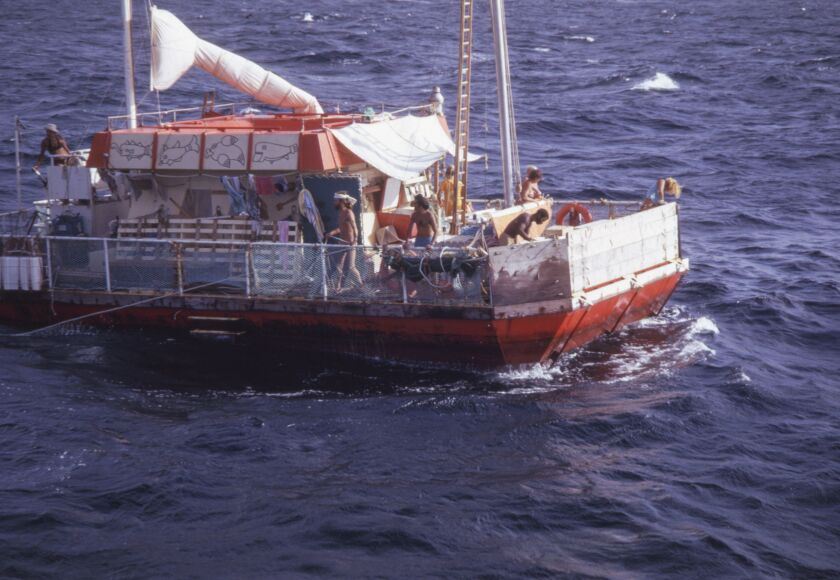Here’s your elevator pitch for a feature film called “The Raft.”
In the 1970s, a small, international group of attractive young men and women agree to be part of a social experiment in which they’ll sail the Atlantic for 101 days while a Svengali-like anthropologist studies them and encourages sexual encounters and in-fighting.
Halfway through the trip, growing increasingly resentful of the possibly mad scientist, his subjects talk of mutiny — and even murder.
Crazy, right?
Even crazier: It all really happened.
Marcus Lindeen’s fascinating and well-crafted “The Raft” is one of those “Wait, WHAT?!” documentaries that has one Googling to make sure this is an actual non-fiction accounting of events and not some elaborate put-on with staged footage and actors portraying the subjects.
It’s real. Real nuts.
The year was 1973. The Mexican anthropologist Santiago Genoves, then 50, was intrigued, almost obsessed with exploring whether a group of young men and women thrust together in a controlled but potentially dangerous environment would learn how to co-exist in peace and harmony — or break off into factions, betray one another and get involved with power struggles, with the men seeking to establish dominance over the women.
Also, if they happened to get naked and couple up, that’d be fine, too. Genoves was just there to observe, not to judge or intervene.
So yeah, this was basically “The Real World” meets “Big Brother” with a little “Bachelor in Paradise” before anyone ever heard of the term “reality TV.”
Genoves assembled a group of volunteers from around the world — all young, all good-looking, all infused with adventurous spirit. The crew members on the ship (named the Acali) included an Israeli doctor, a Swedish merchant marine; an Angolan priest, a Japanese photographer, an African-American engineer and a French SCUBA diver, among other free spirits willing to be a part of the sensational and controversial experiment.
The anthropologist dubbed the 101-day excursion from the Canary Islands to Mexico “The Peace Project.” The press called it “The Sex Raft.”
The reality was somewhere in between.
There was great fanfare surrounding the birth of the experiment. A huge crowd and a media pack showed up to send them off.
“It almost felt like were celebrities,” says one former crew members. Another says it was like they were astronauts, and once they were out on the open waters, they felt free.
Director Lindeen combines film footage taken during the excursion with voice-over readings from Genoves’ writings, read by the actor Daniel Gimenez Cacho (Genoves died in 2013). In a loopy but effective touch, he reunites some of the surviving members on a plywood replica of the Acali on a soundstage in Sweden, where they share memories from the excursion.
They’re grateful for the experience and they’re still fond of one another after all these decades — but they believe Genoves was a charlatan and a danger to their safety, to the point they discussed taking turns stabbing him, a la “Murder on the Orient Express.”
As the ship slowly made its way across the Atlantic, the “subjects” disappointed the increasingly petulant Genovese with the answers they gave to his daily questionnaires, and their refusal to behave in a way that met his expectations.
“They clearly don’t understand what I’m trying to do,” wrote Genoves. “Instead of supporting me, they behave like a bunch of children.”
Guess there were no mirrors on the ship.
Blinded by his ego, acting like the captain of the Bounty, Genoves apparently never realized the experiment was valuable and was yielding interesting if surprising results.
He was the one element of the experiment that really didn’t get it.






